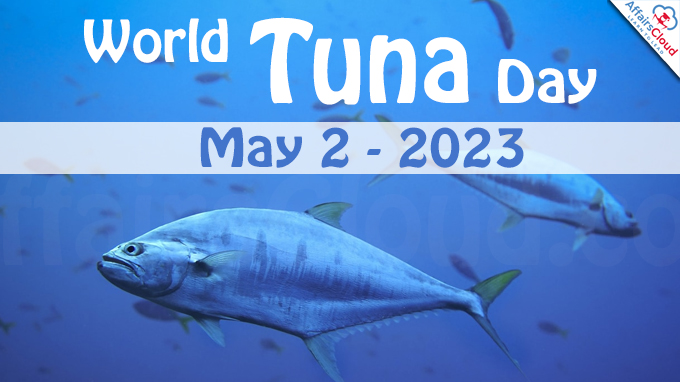 United Nations (UN)’s World Tuna Day is annually observed across the globe on May 2 to raise awareness about the importance of tuna and to promote more sustainable fishing practices.
United Nations (UN)’s World Tuna Day is annually observed across the globe on May 2 to raise awareness about the importance of tuna and to promote more sustainable fishing practices.
- World Tuna Day 2023 was observed on 2nd May 2023.
Background:
i. The United Nations General Assembly (UNGA) adopted the resolution A/RES/71/124 on 7th December 2016 and proclaimed May 2 of every year as World Tuna Day.
ii. The 1st ever World Tuna Day was observed on 2nd May 2017.
About Tuna:
Family/Genus- Scombridae/Thunnus
Status- Some species are critically endangered
i. A tuna, a saltwater fish, is comprised of 15 species across 5 genera, with sizes ranging from the tiny bullet tuna to the 2 m-long Atlantic bluefin tuna, which is believed to believed live up to 50 years.
ii. According to the UN’s Food and Agriculture Organization (FAO), most tuna stocks are fully exploited (meaning there is no room for fishery expansion) and some are already overexploited (there is a risk of stock collapse).
Note: SDG- Sustainable Development Goal (SDG) 14 is about conserving and sustainably using the oceans, seas and marine resources.
Facts:
i. According to the UN, a large number of countries worldwide depend on tuna for both food security and nutrition.
ii. At the same time, there are tuna fisheries in more than 80 countries, and their capacity is constantly growing.
Some Benefits of Tuna:
i. The high levels of omega-3 fatty acids in tuna fish may help to reduce the level of omega-6 fatty acids and LDL (low-density lipoprotein) cholesterol that can accumulate inside the arteries of the heart.
- Consuming more omega-3 is associated with reduced rates of cardiovascular disease, including heart attacks.
ii. The omega-3s in tuna also seem to have a positive effect on eye health.
iii. Omega-3 fatty acids found in tuna are also believed to reduce inflammation and decrease the growth of tumour cells in the body.
Key Points:
i. More than 7 million metric tons of tuna and tuna-like species are harvested yearly.
ii. Tuna and tuna-like species include approximately 40 species occurring in the Atlantic, Indian, and Pacific Oceans and in the Mediterranean Sea.
iii. Tuna species account for 20% of the value of all marine capture fisheries and over 8% of all globally traded seafood.
iv. The annual value of tuna, which is currently managed and conserved by over 96 countries, is almost USD 10 billion, and certain FAO-relevant programmes have started showing positive results in reducing overfishing.
About the Food and Agricultural Organisation (FAO):
Director-General- QU Dongyu
Headquarters- Rome, Italy
Establishment- 1945
Member States- 194 member states




